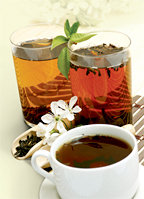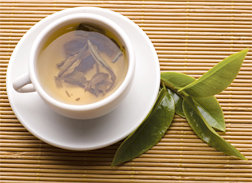Tea Time
By Editorial Staff
How long have people been drinking tea?
For nearly 500,000 years, according to archeological evidence suggesting early cultures steeped tea leaves in boiling water. Originally cultivated in China and India, tea is a popular beverage (and "tea drinking" a popular practice) worldwide, and not just as a way to relax, unwind and spend time with friends. Used for centuries for a variety of medicinal purposes, increasing research suggests tea indeed possesses potent disease-fighting properties. Let's learn more about tea and how it can help you stay healthy for a lifetime.
With the exception of water, tea is the most-consumed beverage in the world, and it's available in a variety of colors and fairly distinct flavors. Three of the most common are green, black and oolong, which are derived from the leaves of the same plant: Camellia sinesis. Processing is what makes one type different from another - green tea is made from unfermented leaves that are steamed, rolled and dried, while black tea is made by putting the leaves through a process of oxidation that alters their color and flavor. Oolong tea is somewhere in between green and black in terms of its color, flavor and processing.
 From a health perspective, you can't talk about tea without talking about polyphenols, compounds found in tea leaves and other plants. The less processing the tea undergoes, the higher its polyphenol content, which is why research suggests green tea has so many potential health benefits. Polyphenols are powerful antioxidants, the same compounds that give fruits and vegetables their disease-fighting capabilities. Antioxidants reduce damage to cells, which reduces the risk of developing cancer and other diseases.
From a health perspective, you can't talk about tea without talking about polyphenols, compounds found in tea leaves and other plants. The less processing the tea undergoes, the higher its polyphenol content, which is why research suggests green tea has so many potential health benefits. Polyphenols are powerful antioxidants, the same compounds that give fruits and vegetables their disease-fighting capabilities. Antioxidants reduce damage to cells, which reduces the risk of developing cancer and other diseases.
According to the U.S. Department of Agriculture, approximately 75 percent of all tea produced worldwide is of the black variety, while only 23 percent is green and 2 percent is oolong. But those percentages may change as research continues to link polyphenols to better health outcomes. That's not to say tea in general (regardless of the type/color) doesn't have potential health benefits; here are a few examples to consider:
Cancer: Numerous studies suggest that green tea protects against a range of cancers including lung, breast and prostate cancer. For example, the Iowa Women's Study noted a substantial reduced risk of digestive and urinary tract cancers in postmenopausal women who consumed two or more cups of tea daily for eight years. Another study found a 42 percent reduced risk of colon cancer in tea drinkers compared to nondrinkers. Evidence suggests this anti-cancer activity is attributable to polyphenols including theaflavins and epigallocatechin gallate (EGCG), which may inhibit proteins linked to tumor growth.
 Heart Health: In one study, people who consumed five cups of black tea daily for three weeks reduced their blood lipid levels (high levels contribute to heart disease) by up to 10 percent. In another study, people who drank green tea had better blood vessel function 30 minutes after consumption. Drinking one cup of tea increased blood vessel dilation (more blood flowing through the artery; thus less risk of clogging) than drinking a non-tea beverage or hot water.
Heart Health: In one study, people who consumed five cups of black tea daily for three weeks reduced their blood lipid levels (high levels contribute to heart disease) by up to 10 percent. In another study, people who drank green tea had better blood vessel function 30 minutes after consumption. Drinking one cup of tea increased blood vessel dilation (more blood flowing through the artery; thus less risk of clogging) than drinking a non-tea beverage or hot water.
Metabolism: Studies including those published in the American Journal of Clinical Nutrition suggest green tea raises metabolism and improves glucose tolerance and insulin sensitivity, all of which is good news in terms of obesity and diabetes prevention. Compounds in green tea also may increase the body's ability to burn calories, thus increasing overall energy expenditure. Tea was more effective than caffeinated water, suggesting polyphenols (rather than caffeine, a known stimulant) were the key compounds involved.
 Oral Health: Two specific polyphenols (catechins and theaflavins) inhibit growth of oral bacteria, according to researchers at the University of Illinois at Chicago School of Dentistry. The compounds are found in green and particularly black tea. Another study supports this health benefit, suggesting green tea extracts discourage the growth of bacteria and may help infections such as strep throat.
Oral Health: Two specific polyphenols (catechins and theaflavins) inhibit growth of oral bacteria, according to researchers at the University of Illinois at Chicago School of Dentistry. The compounds are found in green and particularly black tea. Another study supports this health benefit, suggesting green tea extracts discourage the growth of bacteria and may help infections such as strep throat.
Bear in mind that tea contains caffeine, which can have negative health effects, and decaffeination tends to reduce polyphenol content. Certain medications can also interact with tea, so it's important to communicate with your doctor. That said, next time you take a break from your day and sit down to enjoy a nice cup of tea, recognize you may be accomplishing a whole lot more in terms of improving your overall health.

